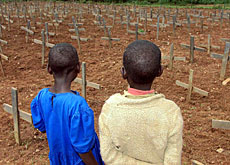Children’s books bring back Rwandan smiles

A Swiss non-governmental organisation has been helping young children in Rwanda discover the joys of reading.
“Books are part of my own history; I fell into the literary world years ago,” Agnès Gyr-Ukunda, one of the driving forces behind the NGO, Books for Rwandan Children, told swissinfo.
Growing up in Rwanda in the 1970s, Gyr-Ukunda was fortunate enough to receive a “privileged” education, allowing her to discover new worlds through literature.
But in 1973 her very own world collapsed when a coup d’état forced her to flee to Burundi. She came to Switzerland seven years later.
In 1994, shocked by the genocide and civil war back home, she decided that she had to do something for her suffering countrymen, particularly the younger generation, even though she was living far away in Switzerland.
At the time, international organisations were rushing to Rwanda to help, but little was being done for the distressed children, many of whom had lost their parents.
“I still have this image in my head of well-dressed but terribly sad children sitting in an orphanage,” she explained. “Nobody was taking the time to sit down and talk to them, or tell them a story.”
Her fear was that many young traumatised Rwandan children who had lost their parents and could not read were in danger of losing part of their cultural identity.
Tradition
In Rwanda reading is not part of the culture: there are very few books and writers. But despite the absence of written literature, the country has a rich oral storytelling tradition. Families are used to meeting up to tell each other well-known tales.
“Traditional stories help teach us about life, how to respect one another and live together – people always need these kind of stories,” she explained.
In 1995 she and her husband decided to set up a Swiss NGO and a Rwandan publishing company, Editions Bakame, to create and promote traditional children’s stories written in the national language, Kinyarwanda, and to give them “their own proper literature”.
Today Editions Bakame is the only children’s publisher in Rwanda trying to satisfy the needs of the country’s avid new readers. “It was important for me to give something back, to bring traditional spoken stories back to life and give a chance to those still creating new ones,” she explained.
Ups-and-downs
The first Bakame books were published in 1995 after the launch of an appeal for traditional stories on Rwandan radio, which resulted in over 3,500 replies. Since then, there has been a steady stream of new titles – three per year each with an average 5,000 to 10,000 print run.
Since it was set up, Editions Bakame has published 28 different titles and distributed over 400,000 books in schools and libraries. The majority are written and printed locally and sold at an “accessible price”, with the NGO and its donors providing additional financial support and expertise.
Running a Rwandan publisher from Switzerland has come with its own fair share of ups-and-downs.
“With such a strong oral storytelling tradition, the initial problem was actually convincing people of the importance of children’s books,” she said.
They then found that, despite their availability, new books were just not being read. Promotional reading campaigns in schools, and special training for teachers to help them use storybooks in the classroom have been part of their ongoing work, alongside the publishing of new material.
Turning the page
Eleven years on the future of the NGO and its publishing company seems secure. As Rwandan society transforms itself following the genocide, Bakame Editions has become a household name and its sphere of activities has continued to expand.
The NGO has recently organised courses for African illustrators and writers, and at the end of June it launched a new “rucksack libraries” reading campaign for schools at a literacy workshop in Kigali, jointly organised together with the International Board on Books for Young People (IBBY) and Unesco.
The NGO has distributed some 100 rucksacks packed with storybooks to be passed between primary school classes with the aim of encouraging reading among school children.
swissinfo, Simon Bradley
UNDP Human Development Report 2005: Rwanda
Population: 9 million
Official languages: Kinyarwanda (99% of population), French and English (approximately 1%)
Child mortality rate under five: 18.3%
Life expectancy at birth: 43.9 years
Adult literacy rate (over 15 years): 64%
Combined gross enrolment ratio for primary, secondary and tertiary schools: 55%
Gross national product: $1.7 billion
Human Development Index: 159 out of 177
At the end of 2004, The Swiss Agency for Development and Cooperation decided to extend for another four years (2005-2008) a special funding programme with Rwanda.
Switzerland also decided to gradually regionalise its programme by extending it to Burundi and then to the eastern part of the Democratic Republic of Congo based on the progress made in the transition process and on the security conditions in these countries.
The total programme budget for the Great Lakes area is SFr8 million ($6.48 million) a year, of which SFr5 million goes to projects in Rwanda and SFr3 million for regional activities.
Switzerland’s cooperation programme focuses on health, Rwanda’s decentralisation process, justice and human rights.

In compliance with the JTI standards
More: SWI swissinfo.ch certified by the Journalism Trust Initiative












You can find an overview of ongoing debates with our journalists here . Please join us!
If you want to start a conversation about a topic raised in this article or want to report factual errors, email us at english@swissinfo.ch.